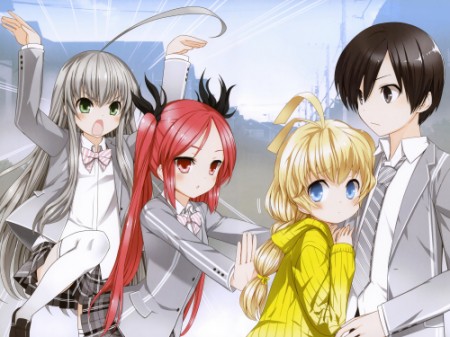Ask John: Why Can’t the Harem Hero Ever Make Up His Mind?

Question:
Why is it such a common aspect of the harem anime that the guy at the center or a hurricane of women that all love him be totally oblivious to it all, or totally unable to pick one? I can understand not being able to choose, but whether it’s an inability to choose or wearing blinders, why is this such a common trope?
Answer:
My interpretation is that you’re posing two different questions. The harem protagonist being oblivious to the affections of his surrounding girls is one situation. The boy knowing that a number of girls pine for him and refusing to commit to one of them is an entirely separate situation. As foreign anime viewers, we should remain conscious that anime often aims to be counter-culture. Anime frequently encourages an expression of individuality and self-determination that’s not as commonplace or practical in actual real-life Japanese society. But anime is also naturally informed by the innate conventions of Japanese society and philosophy. Anime characters are Japanese, and they’re created by Japanese artists, so these characters inescapably adhere to select Japanese characteristics. The character who simply doesn’t recognize that he’s an object of affection for a variety of girls, such as Love Hina’s Keitaro Urashima or possibly Isekai no Seikishi Monogatari’s Kenshi Masaki, or magnetic characters like Kimi ni Todoke’s Shota Kazehaya or Arima in Chocotan, represents a typical Japanese humility. Typical Japanese teens are a bit socially awkward and unfamiliar with relationships with the opposite gender. The oblivious character represents that “everyman” otaku that can’t even imagine himself as an object of affection for multiple girls due to a combination of limited self-esteem, personal insecurity, and an ingrained sense of humility. Alternately, these characters are naturally so considerate that they’re friendly to everyone and see everyone in a reciprocal light, envisioning every approach as mere friendliness instead of presuming romantic interest. Notice that male characters who do boast of their popularity with girls and exploit their “harems” are often depicted as egotistical inconsiderate jerks. The young man that doesn’t even realize that multiple girls are coming onto him is unaffected, kind to all, considerate.
The male protagonist that refuses to choose a partner, like Haiyore! Nyaruko-san’s Mahiro Yasaka or Tenchi Muyo’s Tenchi Masaki, is less a reflection of Japanese stereotype and more a literary trope. Refusing to choose a singular partner sustains possibility and opportunity for romantic comedy situations. A protagonist that refuses to commit to a single girl becomes an effective stand-in for the viewer, allowing the viewer to personally make his own choice of ideal girlfriend. In very infrequent cases, such as Ai Yori Aoshi, the protagonist does decidedly commit to a single girl. But doing so shifts the story from the realm of “harem comedy” arguably to straightforward “romance.” In order to maintain the “harem” trope without driving the story into the realm of exploitative pornography, the protagonist must keep all possibilities open by refusing to commit to any single girl. Formalizing relationships with one or multiple girls immediately breaks the “harem comedy” narrative structure and turns the story into a different type of narrative.

